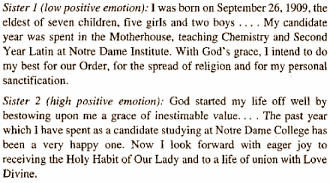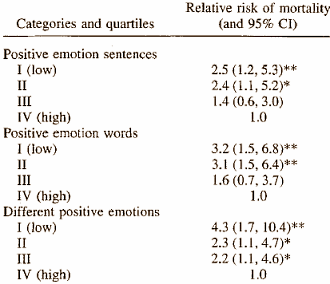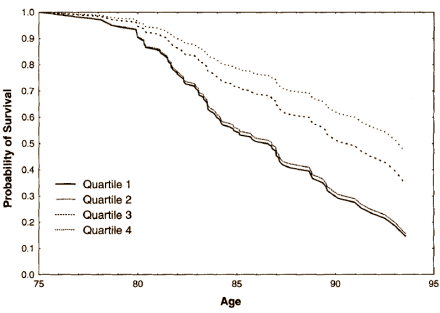|
Definition: "An ergogenic aid is any substance or phenomenon that enhances performance "
|
|
||||||||
13.06.2013 |
|
|
Positive emotions extend life expectancy by ten years
The more positive your attitude to life is - the more optimistic, upbeat, content and happy you are - the longer you are likely to live. According to researchers on the aging process at the University of Kentucky, a positive attitude to life can add more than a decade to your life expectancy. The researchers base this bold assertion on research done on 180 nuns.
Positive emotions & life span
But life expectancy is determined by many more factors, such as marital status, social activities, smoking and alcohol, access to medical facilities and physical activity. Thats why the researchers decided to study nuns; they all live largely the same kind of lifestyle. That makes it easier to focus on the presence of positive emotions.
Study
In 1930, when the sisters were between 18 and 32, they had been asked to write a short autobiography by their Mother Superior. The researchers decided to analyse the autobiographies of 180 nuns who had lived in convents in Milwaukee and Baltimore.
Results
Nuns that had written about the most different types of positive emotions had a four times lower risk of mortality than the nuns who expressed the fewest positive emotions. The difference in life expectancy between these two groups was 10.7 years.
The figure below shows the survival curves of the four groups of nuns. Quartile 1 is the group of nuns with the lowest number of sentences describing a positive emotion; Quartile 4 is the group of nuns with the highest number of positive sentences. The life expectancy of the nuns in Quartile 4 exceeded that of the nuns in Quartile 1 by 6.9 years.
The researchers calculated that for every one percent increase in the number of positive sentences the nuns' mortality risk decreased by 1.4 percent.
The researchers were surprised at the strength of the effect they found. They suspect that scientists have not noticed this before because a positive attitude to life is often associated with unhealthy behaviour. It's only likely to emerge if you study groups of people who are unable to live unhealthy lifestyles - like nuns.
Conclusion
"In contrast, all participants in the current study had lived a lifestyle in which such health-risk behaviors were improbable and therefore the physiological impact of a positive emotional style was almost certainly enhanced."
Source:
More: Archives:
|
|
|||||||||||||||






